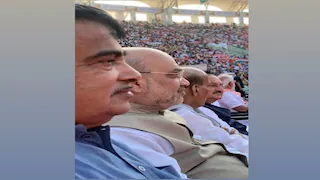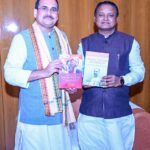When a photograph is enough to suggest the deepening and strengthening of Indian democracy
- By : Anirban Ganguly
- Category : Articles

On the day Yogi Adityanath took oath along with his Cabinet colleagues, a particular photograph went viral on social media. The photograph which caught the imagination of India showed, in profile, five BJP leaders in a row on the stage attending the oath-taking ceremony. They were Nitin Gadkari, Amit Shah, Rajnath Singh, JP Nadda and Prime Minister Narendra Modi. Radiating a profound symbolism, the snap portrayed a number of essential dimensions. These dimensions are gradually altering India’s politicalscape; it is a change that is laying a stronger and studier democratic foundation for India.
The fact that this change is happening and its contours and effects are visible, now, when India is observing the 75th year of her swaraj, is doubly symbolic. This is a change that Prime Minister Modi has heralded and keeps alluding to. He sees this as imperative for unleashing the India narrative over the next quarter-century. It was a moving image and showed that 75 years after Independence, India has finally got a truly democratic party as its ruling party. In these decades in the past, India’s dominant ruling party, the Congress, while professing democracy had increasingly turned into an autocratic and anti-democratic entity controlled and directed by one family with a domineering sense of entitlement. That phase has conclusively passed and each passing year since 2014, the dominance and relevance of autocratic and dynastic political parties is weakening and fading.
All five leaders in the photograph symbolise and represent ‘new India’. They come from non-political families, did not have a legacy to fall back on and never insisted on or took support of their pedigree. For Prime Minister Modi who comes from a very humble background there was no question of an estate, or legacy or pedigree. Each one of these leaders have gone up the organisational ladder through the dint of sheer hard work, commitment to the ideology, having committed a lifetime to public service and to the party. Each at the helm of the party has left a mark by further deepening India’s and the party’s democratic roots and nature.
Prime Minister Modi, who has just completed two decades of holding an elected public office, has transformed for good India’s political narrative and its manifestations. Nadda cut his teeth in politics as a student leader, struggled his way up, becoming a young minister in Himachal Pradesh and then gradually moving to national politics. Rajnath Singh, born into a farmer family, also taught physics in a local college in Mirzapur before gravitating towards politics. Amit Shah’s parents were Gandhians, dedicating their life to the empowering of the marginalised. Shah started off his political career as a booth president in Ahmedabad and rose on to become the youngest president of the BJP at 49. Perhaps it is because of such non-privileged and non-dynastic origins, these leaders have often been hit with acidic barbs by dynasts who obviously see their dominance being rejected by people.
As national president of the BJP, Amit Shah would often say that no one knew who would become the president of the BJP after him, but everyone knew who would succeed Sonia Gandhi as president of the Congress. This home-truth, spoken in a direct and earthy way, pointed at the unnatural grip of dynastism on some of India’s principle parties and of how such autocratic control was detrimental and degenerative for the overall democratic political health and index of the country. Shah would never tire to remind his listeners and party workers that the BJP’s hallmark since the days of the Jana Sangh has been of nurturing political and organisational talent. This continues to remain undiminished and has ensured that the movement has sustained for over seven decades.
Five odd decades of this long seven-decade period was spent struggling in Opposition and trying to ensure that the narrative of India did not turn out to be a monochromatic and one-sided one. If one were to look at the presidents of Jana Sangh, none of them belonged to a political family and none promoted their family members into positions of power. A worker-centred and ideology-driven, creative political action-oriented party, the BJP’s leadership, its political guides and mentors have, over the years, made sure that the party grew and expanded organically.
With its base widening through social and political empowerment and inclusion, has eventually enabled the party to develop a sturdy leadership base. None of these leaders, seen in the widely circulated photograph, came to public life with a sense of entitlement or with a sense of being born into power. None of them have had to exercise the power of office because they were born into a certain family, but because they came to these positions of responsibility through the dint of merit and of sustained and active involvement.
The BJP is increasingly being seen as the only political party with its democratic roots deepening. It is also deepening India’s democratic foundations. Such a deepening is also preparing the ground for a more authentic and credible democratic participation. Many more from the grassroots can now aspire to shape the new India story and not be compelled to sit on the margins or to be relegated to the periphery.
On the other hand, dynasty and family-controlled parties, whose allegiance to India’s democratic essence has always been tentative, who have lacked any kind of ideological foundations and have always failed to nurture non-family political talent are staring at one of their worst existential crises since India became a republic. Parties such as the autocratic family-run Trinamool Congress, the Congress itself, the Samajwadi Party and a host of smaller entities, are either shrinking or are unable to widen their base beyond the limits of their states. Internal strife, factionalism, petty-struggle for control and disconnect from the psyche and aspirations of people at large are pushing these parties into a vicious and self-destructive cycle of resource generation and collection for maintenance of a political family or clan. Devoid of a narrative, lacking an India story, shorn of a roadmap and unable to evolve a credible political programme and stratagem, they have degenerated simply into levy collecting machines.
In his public meetings during the election campaign, Prime Minister Modi had repeatedly spoken of the need to free India from the clutches of dynasty-dominated and controlled parties. Such a release would eventually unshackle India’s potential for emerging as a grassroots-based, empowered civilisational democracy, he has argued. None more than him has contributed to dismantling that artificial structure of unfair and uneven privilege. For decades, it was the Jana Sangh’s unprivileged leaders who had kept up the challenge to the Nehruvian consensus and today it is the BJP’s un-pedigreed leaders, as reflected in that emotion-evoking photograph, who have credibly reinstated India’s democratic political essence and its deeper spirit.

















